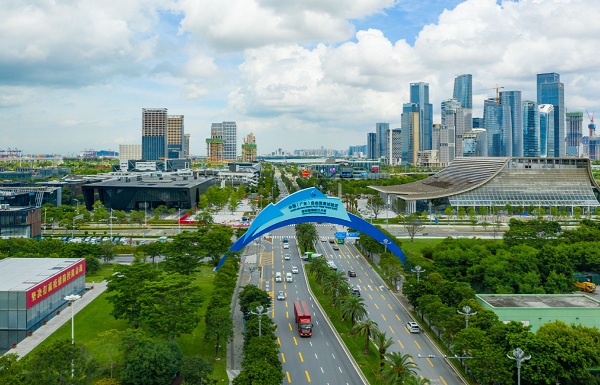Cities encouraged to seize development opportunities

An aerial view of the Qianhai free trade zone in Shenzhen, Guangdong province. [Photo/Lu Li/For China Daily]
The development initiatives for Qianhai and Hengqin showcase the central government's faith in the Hong Kong and Macao special administrative regions and highlight the unique advantages of the two cities, an online seminar was told on Monday.
The seminar was held after the recent announcements of the development plan for the Guangdong-Macao in-depth cooperation zone in Hengqin, Guangdong province, and the plan for deepening reform and opening-up of the Qianhai Shenzhen-Hong Kong Modern Service Industry Cooperation Zone.
Xu Ze, president of Chinese Association of Hong Kong and Macao Studies, applauded the plans for providing guidance, policy protection and support for the further development of the Guangdong-Hong Kong-Macao Greater Bay Area.
"The promulgation of the plans reflects the dedication and determination of the central government to reform and opening-up," he said at the seminar organized by Hong Kong Coalition, an organization founded a year ago to help the city revitalize. "Opening-up must be continuous, and reform can never cease."
Acknowledging the exceptional contributions that Hong Kong and Macao have made to national development, Xu said he expected the two cities to be proactive in pushing forward the new plans.
Areas such as artificial intelligence, smart medicine, smart cities, fintech, the internet of things and new energy need to be focused on, he added.
Paul Chan Mo-po, financial secretary of the Hong Kong SAR, said the extension of the Qianhai cooperation zone from 14.92 square kilometers to 120.56 square km, an area equivalent to Hong Kong Island and Kowloon combined, will create a crucial testing ground for Hong Kong's economic development. It will also relieve the land shortage problem, which has significantly curtailed the city's development, he said.
Leung Chun-ying, vice-chairman of the National Committee of the Chinese People's Political Consultative Conference, China's top political advisory body, welcomed the seminar.
He said it was a much-needed occasion for members of the public in Hong Kong and Macao to gain a more comprehensive understanding of what's unfolding in the bay area through interpretations of the plans by key speakers at the seminar.
In Shenzhen, officials said at a news conference on Monday that complementary initiatives and policies will be introduced to facilitate Qianhai's opening-up. The new measures include preferential policies to attract overseas enterprises and talents, especially from Hong Kong, which will accelerate the opening-up of Qianhai in Shenzhen.
The total area of the Qianhai Shenzhen-Hong Kong cooperation zone will be expanded more than eight times under the new plan. Qianhai's preferential policies for Hong Kong will also be extended to the entire zone, said Shenzhen Mayor Qin Weizhong.
One-third of the new zone's industrial land will be transferred to Hong Kong investors and enterprises by 2025.
Jiang Likun, executive deputy director of Shenzhen's Leading Group Office for Promoting the Development of the GBA, said Shenzhen is aiming for national support in a number of areas.
These include formulation of a high-standard negative list for cross-border services trade in Qianhai, relaxing or removing restrictive measures on businesses, cross-border supplies and the flow of personnel.



 Print
Print Mail
Mail

